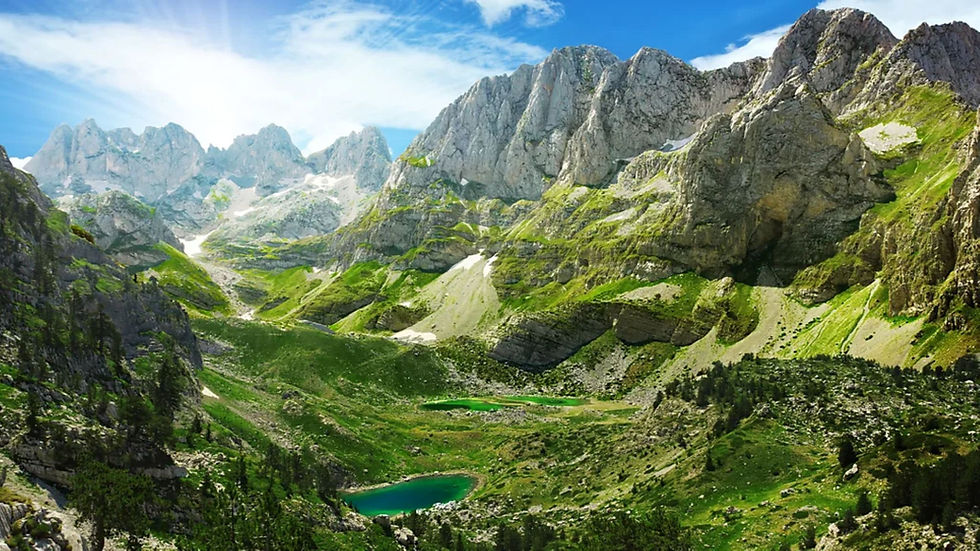Albania’s Mountain Package: Revitalizing the Highlands Through Ownership, Investment & Sustainable Development
- Khoshnaw Rahmani

- Aug 1, 2025
- 4 min read
Khoshnaw Rahmani, Jadetimes
K. Rahmani is a Jadetimes news reporter covering politics.

Executive Summary
Albania’s “Mountain Package” is a landmark legislative initiative designed to formalize land ownership, attract investment, and drive sustainable development in the country’s mountainous regions. Enacted on May 3, 2025, the package offers state land transfers at symbolic fees, fiscally incentivizes the first 500 approved projects, and simplifies bureaucratic processes for local residents and diaspora investors alike. This comprehensive article traces its genesis, legal framework, implementation, challenges, and regional parallels, providing the most authoritative resource on the subject to date.
1. Introduction: The News Unveiled
On May 3, 2025, the Albanian Parliament passed Law No. 52/2025—better known as the “Mountain Package”—with unanimous support across major parties. Aimed at transforming Albania’s underdeveloped highlands into vibrant economic zones, the package immediately generated widespread attention domestically and among the diaspora. Applications opened via the E-Albania portal within weeks, signaling the government’s commitment to rapid roll-out.
2. Historical Context & Policy Rationale
Since the fall of communism, Albania’s remote mountain areas have suffered from economic marginalization, unclear land tenure, and persistent out-migration. Previous “Albania €1” schemes and strategic investment laws focused on coastal tourism and strategic infrastructure but sidelined rural uplands. The Mountain Package emerged to:
Address chronic land-title deficiencies that hamper development
Attract capital to agribusiness, eco-tourism, and local industry
Leverage diaspora ties to repopulate ancestral villages
Integrate environmental stewardship into growth planning
3. Timeline of Key Milestones
Date | Milestone | Source |
Nov 13, 2024 | Government announces draft law targeting diaspora and locals alike | |
Jan 23, 2025 | Citizens.al publishes clientelism critique of draft proposal | |
Mar 2025 | E-Albania portal opens for Mountain Package applications | |
May 3, 2025 | Mountain Package law passes Parliament | |
May 27, 2025 | Deputy Minister outlines sub-legal acts and eligibility criteria | |
Apr 16, 2025 | Eurofast clarifies financing guarantees and “non-owner possessor” rules | |
Jun 2025 (ongoing) | First 500 approvals processed; local projects underway | — |
4. Legal & Institutional Framework
4.1 Eligibility Criteria
To qualify, applicants must demonstrate:
Continuous use of state-administered land for at least 10 years
No overlapping third-party claims or military designations
Submission of a detailed development project plan within statutory deadlines
A new status of “non-owner possessor” enables long-term users to formalize title at a symbolic price of €1 per parcel, unlocking full ownership rights after verification.
4.2 Fiscal Incentives & Support
Approved projects (up to 500 entities nationwide) enjoy a 10-year exemption on:
Property tax and infrastructure impact fees
Value Added Tax (VAT) on construction and services
Income tax on profits derived from approved activities
Institutional support units within municipalities expedite permit processing and provide advisory services to investors and local farmers.
5. Application Process & Geographic Scope
Applications are registered exclusively via the centralized E-Albania portal (packages.gov.al), enabling transparency and real-time tracking. Initial rollout focused on northern districts—Tropoja, Dibër, Kukës, Shkodër, and Malësi e Madhe—with plans to extend southward based on tourism and agrarian potential.
6. Objectives & Expected Impact
Formalize over 50,000 hectares of longstanding informal holdings
Generate an estimated 3,000 new jobs in agro-tourism and related sectors
Increase rural household incomes by 20–30% within five years
Reverse emigration trends among youth by creating local entrepreneurial opportunities
These targets align with Albania’s EU accession goals and UN Sustainable Development Goals on poverty reduction and sustainable communities.
7. Comparative Analysis Within Albania
Initiative | Focus Area | Incentives | Limitations |
Albania €1 Coastal Program | Coastal properties | €1 sale price for derelict properties | Limited to tourism; environmental impacts |
Strategic Investment Law (2019) | Large infrastructure & industry | Tax breaks; land transfers under special status | Complex criteria; low uptake |
Mountain Package (2025) | Mountainous & rural areas | Title formalization; 10-year tax exemptions; advisory support | Cap on 500 investors; transparency risks |
While prior schemes favored large investors and strategic industries, the Mountain Package emphasizes grassroots development and diaspora participation.
8. Criticisms & Implementation Challenges
Despite broad acclaim, experts warn of clientelism, opaque beneficiary selection, and environmental risks:
Transparency Concerns: Critics allege political favoritism due to the 500-applicant cap and symbolic fee structure.
Environmental Safeguards: Privatization of forests and pastures may threaten ecosystems unless rigorous monitoring is enforced.
Budget Accountability: Lack of clear expenditure reporting raises questions about sub-legal act funding and oversight.
Addressing these concerns will require civil-society monitoring, open-data platforms, and periodic legislative reviews.
9. Early Success Stories & Case Studies
In Theth Valley, a family-run guesthouse secured title formalization and launched eco-trekking services, attracting 1,200 visitors in its pilot season.
A cooperative in Kukës turned 25 hectares of informal land into an organic dairy farm, doubling local producer incomes within six months.
Such examples underscore the package’s potential to catalyze community-driven growth.
10. Regional Parallels: Lessons from the Balkans
North Macedonia’s Rural Revival Fund and Montenegro’s Mountain Ecotourism Zones offer instructive contrasts:
North Macedonia ties subsidies to cooperative governance, ensuring local stakeholder buy-in.
Montenegro’s model imposes strict visitor caps to preserve biodiversity in high-altitude parks.
Albania can integrate these best practices to bolster governance and environmental resilience.
11. Expert Commentary
Enkelejd Musabelliu, Deputy Minister for Economy, Culture & Innovation, emphasizes that the core aim is economic development, not merely land titling: “The Mountain Package empowers communities by formalizing their ancestral lands, unlocking access to credit and permits”.
Aranita Brahaj of Open Data Albania warns: “Without transparent selection mechanisms, this law risks becoming a clientelist tool rather than a genuine development driver”.
12. Future Outlook & Policy Recommendations
To ensure the Mountain Package fulfills its promise, policymakers should:
Expand the beneficiary cap based on demand and budget performance
Publish live expenditure dashboards tracking sub-legal act disbursements
Strengthen environmental impact assessments tied to permit renewals
Foster diaspora networks through targeted outreach and mentorship programs
Such measures will enhance transparency, scalability, and sustainable outcomes.
Conclusion
Albania’s Mountain Package represents a bold pivot toward inclusive, location-based development, combining land-tenure reform with deep fiscal incentives. Its success hinges on transparent governance, environmental stewardship, and sustained community engagement. If these elements coalesce, Albania’s highlands may become a global exemplar of rural regeneration and diaspora-led renewal.











































Comments